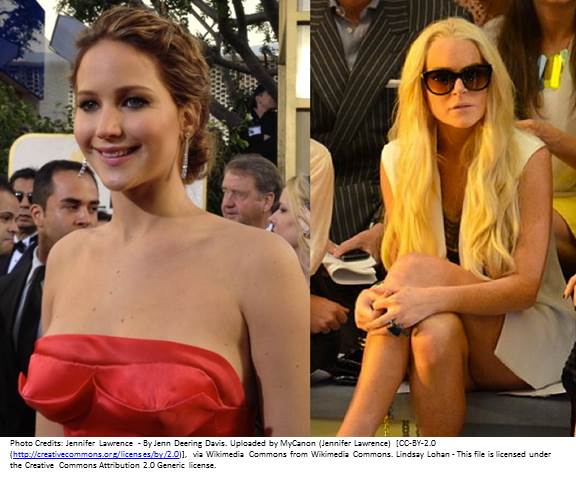
In high school we called it popularity and we aspired to it without a trace of irony. As adults, we only refer to it when talking about celebrities -- those Dancing With the Stars contestants, Real Housewives and American Idol runners-up who make up the obvious "B" list; the Angelinas and Brads who personify the "A" and all those in-betweens who rise and fall as we ogle raptly on the pages and screens of whatever.
Otherwise, we pretend there is no A and B list in life, that the popularity contests went the way of our teen-aged acne, that ranking does not exist. That we are not all, in some very fundamental way, still in high school.
But of course, that's wishful thinking. The truth is we are forever looking at ourselves in comparison to those around us, creating our own internal A and B lists of who is successful in marriage, in career, financially, as parents, and then putting ourselves in one or the other category. It's as if we just can't see ourselves unless we see ourselves in relation to everyone else. The scientific (psych term) is "reflected self-appraisal." Seeing ourselves as others see us, or more accurately, how we think others see us. It is the reflected self-appraisal that in many contexts drives us towards or away from any particular relationship or how we rank who fits where. We automatically and most unknowingly take what's intuitive and turn to math or science -- our ranking criteria for example, however methodical or not so, to quantify our judgments.
According to Edward Archer, Interdisciplinary Research Fellow with the Arnold School of Public Health, "Science provides a corrective influence to intuition; it allows us to validate the products of our imagination while keeping us from believing things that may to be appear obvious but are, in reality, demonstrably false. The point of science is to separate fact from the transient feelings of intuition... because intuition is easily deceived by the context."
The sad part is, much of the time, even with science and intuition we're left feeling almost as bad about ourselves as we did in high school. The up side is that as adults, we have a lot more tools at our disposal to deal with it -- including what we can learn (seriously) from celebrity culture and the occasional celebrity mishap.
The first and most important lesson is one mom probably told you when you faced some kind of perceived backlash at 16, such as a fight with a friend: you can't control other people, you can only control yourself and how you allow yourself to react and feel about what others do and say.
Take, for example, how one reacts to being publicly scorned on the front page of the tabloids. It would have been nice had Brad and Angelina flirted a bit on the set and left it at that in deference to the sacredness of his marriage vows. But of course, history handed Jennifer Aniston a life script she wasn't expecting, and while she had no choice but to live it, she did get to choose how "Act Two" was perceived.
Losing the popular boy can be a recipe for disaster in the 11th grade and certainly an invitation to the B list if you are not careful in Hollywood. Jennifer never got anywhere close. She kept her dignity, her A list status and her mouth shut. She appeared gracious, dignified and just a little tiny bit victimized. Angie, meanwhile, had a year's worth of stories about how she used to wear a vial of Billy Bob Thorton's blood around her neck. Sure, she is still on the A list, but she is on it the way the mean girls were in high school -- precariously, with someone waiting to pull out the safety net and break out the dagger should she take just one misstep too many.
The careers -- and erstwhile careers -- of our Hollywood doppelgangers can also be a useful guide for the rest of us mortals when it comes to determining what constitutes our own personal A and B list. That's right, our own. While Gossip Girl's Blair Waldorf, the mean girl with Queen Bee status manipulated access and invites that she held close to her chest, in real life land, we do it ourselves.
That doesn't mean that everyone of us will get to decide who is on and who is most certainly off the list for that ritzy cocktail party, who gets the magazine cover this week and who does not make it past the bouncer. But we do get to decide whether we think it matters who makes more money, or shows up on Page Six, or who seems to look good all the time. We get to pick what we respect and what matters and create our own A and B list.
Take a look at yours now, using Hollywood's as a guideline. It might just tell you something about yourself that you can use. No one admits to (or likely does) respect Lindsay Lohan, queen of the B list. But if you gobble up all the news about her latest misdeeds even so, it may suggest that your personal A list is more peopled by attention grabbers than those who actually deserve it but don't seek it out. That's not a value judgment per se, but a valuable piece of information to have. If fame, for its own sake or any sake at all, fascinates you, perhaps it's time to find out where you can shine the brightest and concentrate on it.
Then again, perhaps those Hollywood-land denizens who fascinate you the most are those who seem least fascinated with themselves. If Jennifer Lawrence will top your A list forever, consider what makes her so A-worthy. It turns out authenticity goes a long, long way.
